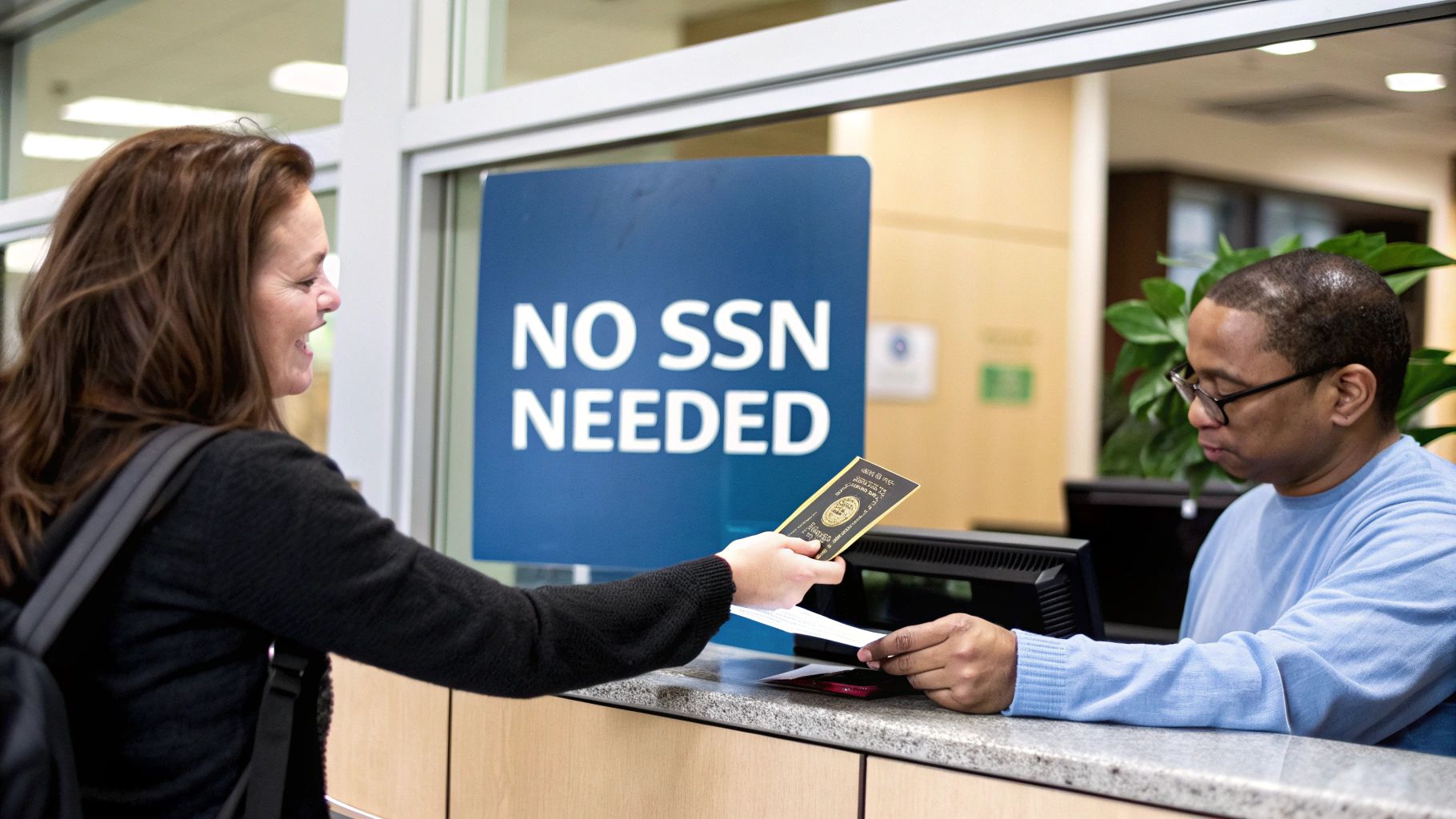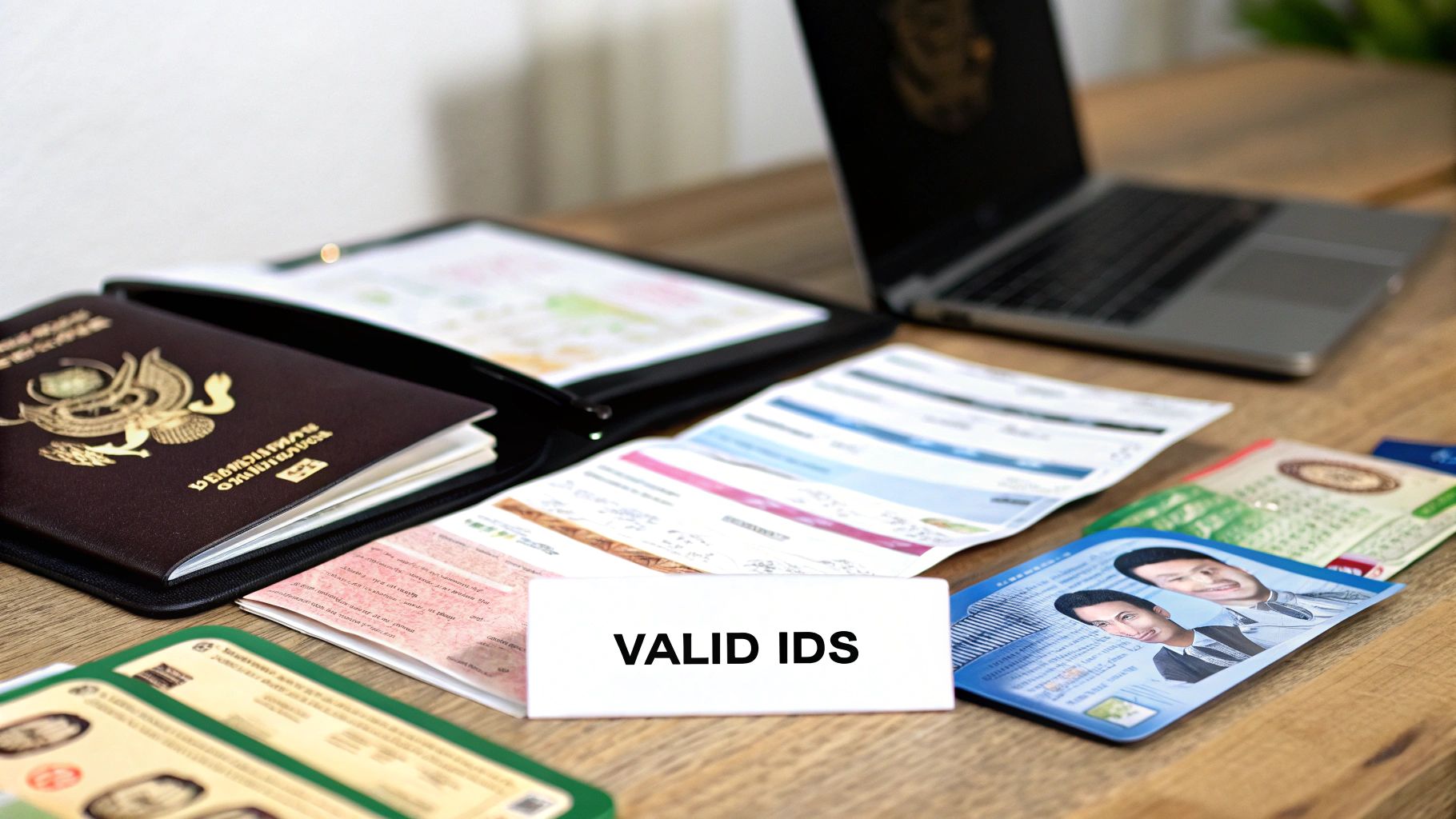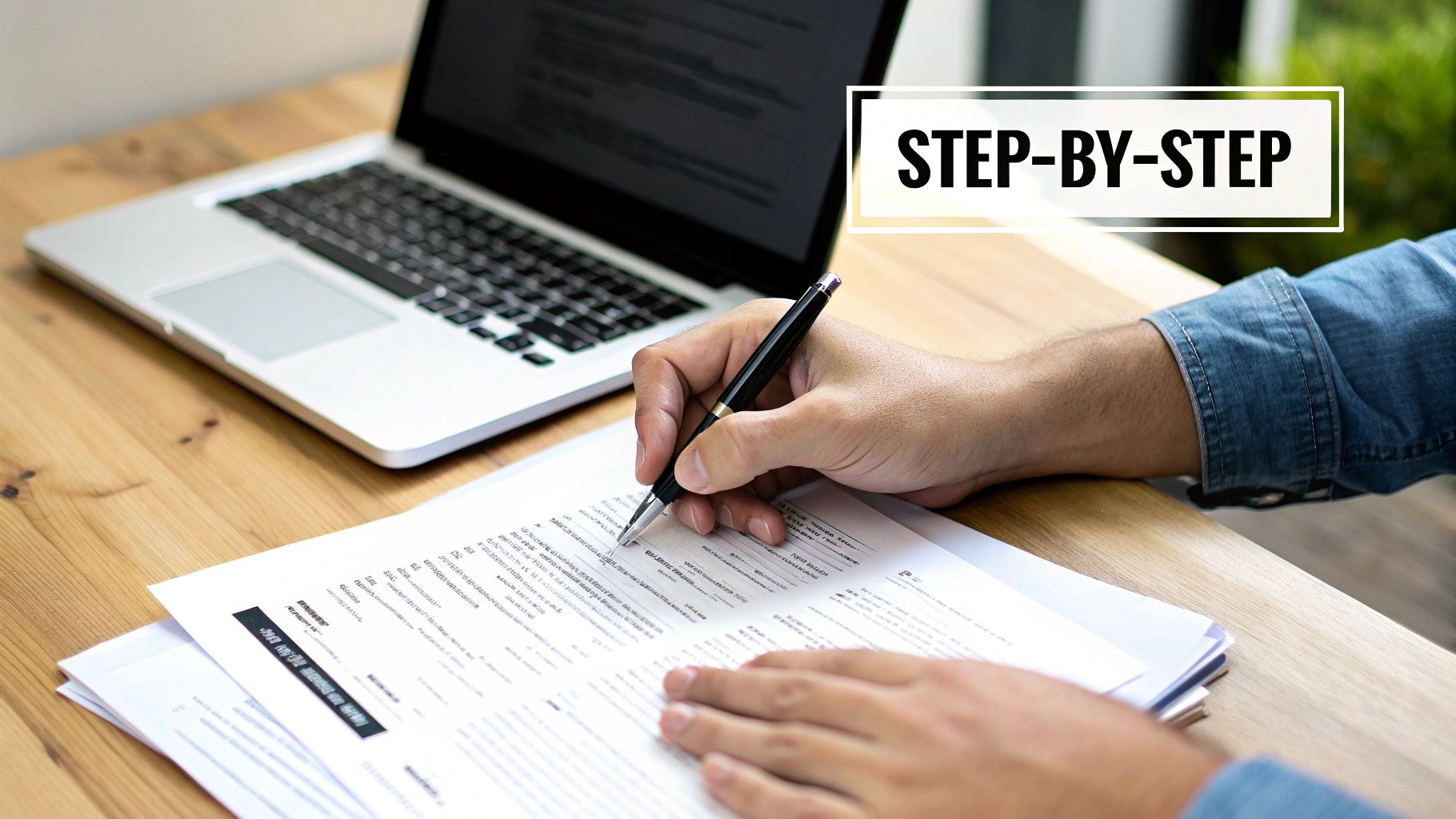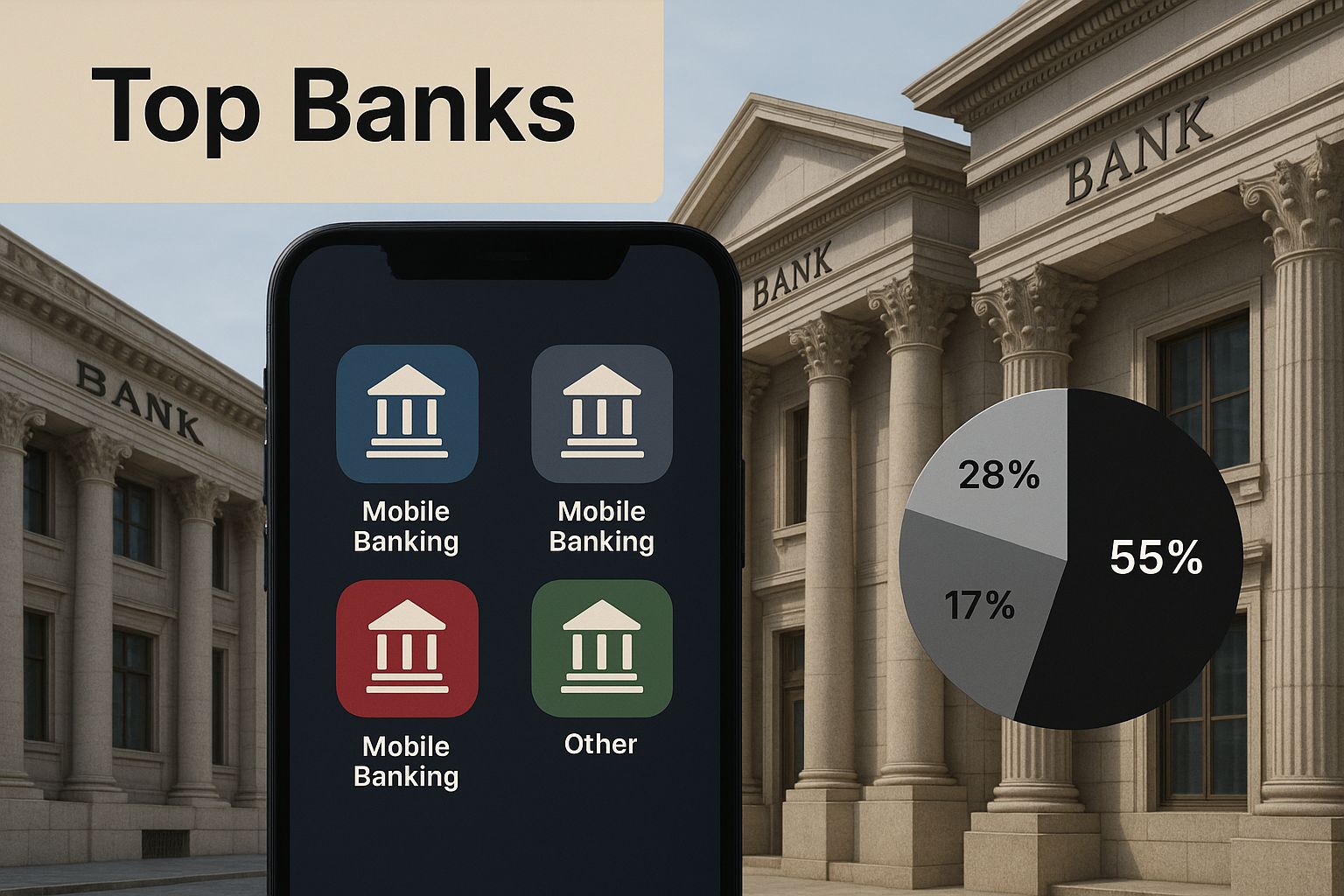How to Open Bank Account Without SSN: Easy Steps Guide

Yes, you can absolutely open a bank account in the U.S. without a Social Security Number. It's a common misconception that an SSN is a mandatory, non-negotiable requirement.
The secret? Banks are primarily focused on one thing: verifying your identity. As long as you can prove you are who you say you are with credible documentation, many financial institutions are happy to work with you.
Why It's Possible to Bank Without an SSN
Let's get one thing straight: while an SSN is the most common identifier for U.S. citizens, it's not the only one banks can accept. The system is actually built with a degree of flexibility to accommodate international students, non-resident business owners, and many others who are legally in the country but don't have an SSN.
Financial institutions are bound by federal regulations designed to prevent things like fraud and money laundering. Their main goal is to confirm your identity, not to exclude people without a Social Security Number. This is where your Individual Taxpayer Identification Number (ITIN), foreign passport, or other government-issued IDs come into play.
The Real Requirements for Opening an Account
So, what do banks actually need from you? According to the Consumer Financial Protection Bureau, every application boils down to four key pieces of information: your full name, date of birth, a physical address, and an identification number.
That last part—the identification number—is where most people get tripped up, assuming it has to be an SSN. It doesn't.
This little detail is a game-changer. It means your valid foreign passport, ITIN, or a consular ID card can often fill that requirement perfectly.
Gathering Your Documents
Before you walk into a bank, it's smart to have all your paperwork in order. This not only makes the process smoother but also shows the banker you've done your homework. For a deeper dive into the specifics, our guide on how to get a bank account without an SSN offers more tips.
Here’s a quick look at the documents you'll likely need to gather. Think of this as your personal checklist.
Required Documents to Open an Account Without an SSN
Having these documents ready demonstrates that you're prepared and serious, which can make a big difference in how smoothly your application is processed.

Your Path to Financial Access
For anyone looking to build a financial foundation in the United States, understanding these rules is the first and most important step.
Once you have a bank account, you unlock the ability to handle essential financial tasks—paying bills online, receiving direct deposits from an employer, and starting to build a U.S. financial history.
Knowing you have options empowers you to walk into a bank with confidence and get the access you need.
Gathering Your Essential Paperwork
Walking into a bank unprepared is a recipe for a wasted afternoon. Let’s make sure that doesn’t happen. Think of this as your personal checklist—everything you need to have in hand to walk in with confidence and walk out with a new bank account.

First things first: you absolutely need solid proof of who you are. The undisputed champion here is your valid, unexpired foreign passport. It’s the one document nearly every bank recognizes and accepts without a second thought.
Even with a passport, many banks will ask for a second piece of identification. It's always a smart move to have a backup, so bring a couple of options if you can.
Your Identification Checklist
Plan on bringing both a primary and at least one secondary ID. Here’s what works best based on what I’ve seen:
Getting an ITIN is a huge step toward building a financial foundation in the U.S. It gets you a bank account, and it's also your key to getting credit. In fact, learning how to apply for an ITIN loan is a great next goal once your account is open.
Proving Where You Live
Once the bank knows who you are, they need to confirm where you live. This is a federal requirement, and they need a physical U.S. address to mail your debit card, statements, and other official documents. A P.O. Box just won't cut it.
Bring at least one of these documents to prove your address. My advice? Bring two different types, just in case one doesn't meet the bank's specific rules.
Gathering these documents ahead of time—your passport, a secondary ID, your official ITIN letter, and a couple of proofs of address—shows the banker you're prepared and serious. It makes their job easier, which makes it much more likely they'll say "yes" to opening your account.
Choosing the Right Bank for Your Situation
Finding a bank that will open an account without a Social Security Number can feel a bit like a treasure hunt. The reality is, not all banks have the same rules. Some are stuck with rigid, outdated policies, while others are far more welcoming to international clients and newcomers. Your goal is to find an institution that sees your complete application—ITIN, passport, and all—as a green light, not a red flag.
This is where a little bit of legwork upfront pays off massively. Spending an hour making a few phone calls or browsing websites can save you from a wasted trip and a ton of frustration. You want to walk into a branch already knowing they can help you.
Big Banks, Local Credit Unions, or Digital Neobanks?
When you start looking, you'll see a few different kinds of financial institutions. Each has its own vibe and way of doing things, which can make a big difference for someone applying with an ITIN.
The infographic below points out some of the top banks that are generally known to be accommodating to non-SSN holders. It's a fantastic starting point for your search.

This visual gives you a quick snapshot of institutions that often have friendly policies for ITIN holders, helping you zero in on the best options right away.
To help you decide, let's break down the main types of banks you'll encounter.
Comparing Bank Types for Non-SSN Applicants
Ultimately, the "best" option really depends on what you need. Do you value face-to-face service, or is a slick mobile app more your style? Thinking through these points will guide you to the right choice.
How to Vet a Bank Before You Ever Set Foot Inside
Here’s the golden rule: never just show up and hope for the best. You need to confirm their policy beforehand. The most reliable way to do this is to call the specific branch you plan to visit. Information on a bank's main website can be too general, but a quick chat with a local banker will give you a clear yes or no.
When you call, the way you ask your question matters. A lot.
Instead, lead with the documents you do have. Try this script:
"Hi, I'd like to open a new checking account. I have my official ITIN assignment letter from the IRS, my foreign passport, and a recent utility bill for proof of address. Are these documents sufficient to open an account at your branch?"
This approach changes everything. It's specific and shows the banker you've done your homework. It forces them to think about the actual documents required by policy, not just a keyword like "SSN."
If they sound confident and say, "Yes, absolutely, bring those documents in," you've found your bank. If they hesitate or sound unsure, just thank them for their time and move on to the next one on your list. Your goal is to find a branch that makes you feel welcome before you even walk through the door.
Going to the Bank in Person
Walking into a bank branch to open an account without a Social Security Number can feel a little intimidating, but it doesn't have to be. As long as you’ve done your homework and have the right documents, it’s a pretty smooth process. The key is to walk in with confidence. You've already confirmed they work with ITIN holders, and you have everything they need.
Your job is to make the banker’s job easy. When you sit down, have all your documents organized and ready to go. A simple folder with your passport, ITIN letter, and proof of address shows you're prepared and makes a great first impression.
What to Say When You Get There
Instead of being passive, take charge of the conversation from the start. A clear, friendly opening can make all the difference and set a positive tone.
You could say something like this:
"Hi, I'd like to open a checking account today. I have my ITIN assignment letter from the IRS, my foreign passport for ID, and a recent utility bill for my proof of address. I believe that's everything I need to get started."
This simple script is powerful because it accomplishes three things at once:
Even with perfect preparation, you might run into a bank employee who isn't familiar with the process for ITINs. If they hesitate or say something like, "An SSN is required for all new accounts," don't panic. Stay calm and polite.
Before You Leave the Bank
Once the banker approves your application, don't just grab your papers and run. There are a few small but critical things to do right then and there that will save you a ton of hassle later.
Take a few extra minutes to lock in these final details:
Ticking off these boxes ensures you leave with a fully functioning bank account. You'll have your card, your online login, and the peace of mind that everything is ready to go.
Opening a Business Account Without a Personal SSN
If you're an international entrepreneur or a non-resident founder, getting your business's finances set up in the U.S. is a massive step. It might seem daunting, but here's some good news: opening a business bank account is often more straightforward than opening a personal one without an SSN.
The entire process hinges on one critical document: the Employer Identification Number (EIN).
Your Most Powerful Tool: The EIN
Think of an EIN as a Social Security Number, but for your company. It's a unique nine-digit number the IRS issues to identify your business for tax purposes. For your purposes, it’s the key that unlocks the door to business banking, completely replacing the need for a personal SSN on the application.
Getting an EIN is also surprisingly manageable, even for non-U.S. residents without an SSN. The IRS has a clear process for foreign individuals to get an EIN for their U.S.-based company. This number allows you to operate financially in the country and, just as importantly, keeps your business finances separate from your personal life. That separation is non-negotiable for clean bookkeeping, protecting yourself from liability, and building a solid financial track record for your company.
Essential Business Documents You Will Need
When you walk into a bank—or apply online—they're looking to confirm two main things: who you are and that your business is legitimate. You'll need to have your paperwork in order.
Get these documents ready before you start:
For founders who have registered their business as an LLC or corporation, the EIN is the primary tool for opening an account. This is true even if you're not a U.S. resident. Often, a combination of your EIN, a foreign passport, and sometimes an ITIN is all you need to prove your identity and get the account open.
Once that business account is up and running, it starts building its own history. Over time, a healthy bank account can be your ticket to getting business loans and credit lines. For a deeper dive on this, check out our guide on how to build credit with an ITIN number.
And if you ever hit a wall with traditional banks, it's good to know there are other avenues for accessing business funding when denied by a bank.
Answering Your Questions About Banking Without an SSN
Even when you have a solid plan, a few "what ifs" are bound to pop up. Getting a bank account without a Social Security Number is a well-trodden path, but that doesn't always make it a simple one. Let’s walk through some of the most common questions people ask to clear up any confusion and help you move forward.